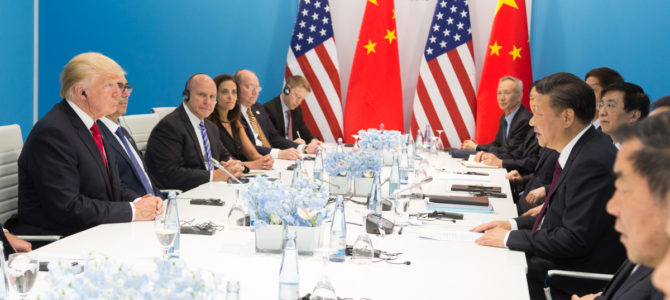
A collective sigh of relief ought to be heard across the Pacific if Donald Trump and Xi Jinping manage to settle their differences over trade when they meet at the G-20 summit in Tokyo next month. But if they don’t, that could lead to another scenario President Trump has been warned about. The Chinese might be patient enough to wait for the 2020 U.S. presidential election to relieve them of their tormentor.
If the dispute drags on for many more months, the odds seem to favor China’s chances of outlasting the Trump administration. At the moment, sad to say, it is the more politically stable and united of the two trading powers. Xi is secure in his seat, effectively president for life. Although the Robert Mueller report on alleged Trump collusion with Russia has turned out to be a dud, the president still has to survive a hail of microaggressions from the Democratic Party and an unloving press before he can be returned to the White House in 18 months.
U.S. stakeholders are divided over whether the tariff war is worth the pain. Some even question whether Trump should have picked this fight. Republican farm-state governors are torn between their concern about dwindling exports of soybeans and pork products to China and their obligation to push the president s agenda.
Trump has at best only the qualified support of big industry. He is opening markets for them in China, but what he really likes them to do is bring their investment money back to America. Sen. Marco Rubio even blames some U.S. corporate chieftains for worsening the trade quarrel because of the bad deals they made with Beijing.
Are Trump’s Methods Appropriate?
Even if the president is doing the right thing, economists question his methods—to many, tariffs are an obscenity. Americans haven’t heard tariffs lauded this much as a means of raising revenue since the days of William McKinley. Some would appreciate the $30 million in tariff revenues the president is saving for distressed American farmers, but not enough to forgive him for his economic heterodoxy.
These impositions, in any event, would only shave off a sliver of the $400 billion U.S. trade deficit. It has gotten that big mostly because Americans consume too much and save and invest too little. If an implied objective of Trump’s trade policy is less consumer appetite for video games and more green-field investments, it could be worth the trouble.
The other flaw in the policy is going it alone, hardly a surprise seeing how the president deems the European Union to be almost as culpable as China for blowing up the U.S. trade deficit. Americans play the game like chess, aiming to knock off the king in 20 or so moves. The Chinese instead are into their classic game of shengqi, based on the strategy of gradually encircling and strangling the enemy.
Beijing Is Making E.U. Inroads
Beijing lost no time in exploiting the breach between the United States and its allies. In April it signed two civil aviation agreements with the European Union, which would effectively advantage Airbus and deal Boeing another blow on top of the U.S. plane maker’s damaged safety record resulting from the 737 MAX crashes.
Feng Zhenglim, the head of the Civil Aviation Administration of China, came close to rubbing it in when he declared that both the EU and China “stand for multilateralism and want to build an open world.” The possible exclusion of British Air from the benefits of the agreements may be a knock on London, too, for daring to separate itself from Brussels.
But this is not the whole story. China has vulnerabilities that could make a long wait too costly for its slowing and debt-burdened economy.
Xi made the mistake of underestimating Trump’s steely resolve to see this fight through and, more critically, the comparative pain tolerance of the two economies. Even though the Xi regime has taken steps to shift the mainsprings of the economy from export reliance to domestic consumption it’s not quite there yet. China is still far more trade-dependent than the United States and thus could hurt more from a prolonged trade squabble.
China Ought to Pursue Respectability
The longer it festers the more companies, Chinese and foreign, will be prone to cancel or delay investment decisions. Trump was exaggerating only slightly when he claimed that companies are fleeing China in droves. By some accounts, the country is losing nearly $1 trillion in capital outflows.
Xi and his negotiating team were badly advised if they persist in regarding the codification of their pledges on market opening and intellectual property protection as tantamount to national humiliation. It is not. China is simply being asked to do what other responsible trading nation would have to do under similar circumstances.
Its practice of using unpublished regulations (nei hu) to privilege domestic firms and mislead foreign ones no longer befits their stature as the world’s leading trading nation. If respect and respectability are what Beijing desires most, putting all their rules on the law books is a good way to earn it.
The president’s own pain threshold could be tested when the second-quarter GDP growth figure comes out. If it drops far below the first quarter’s glowing 3.2 percent, that would mean the trade war is taking its toll. A quick resolution is the best outcome for both sides.
China bears another major risk in pursuing a waiting-Trump-out strategy. If the Democrats continue to show their indifference to governing, Trump could be easily reelected and all that patience would be wasted.









